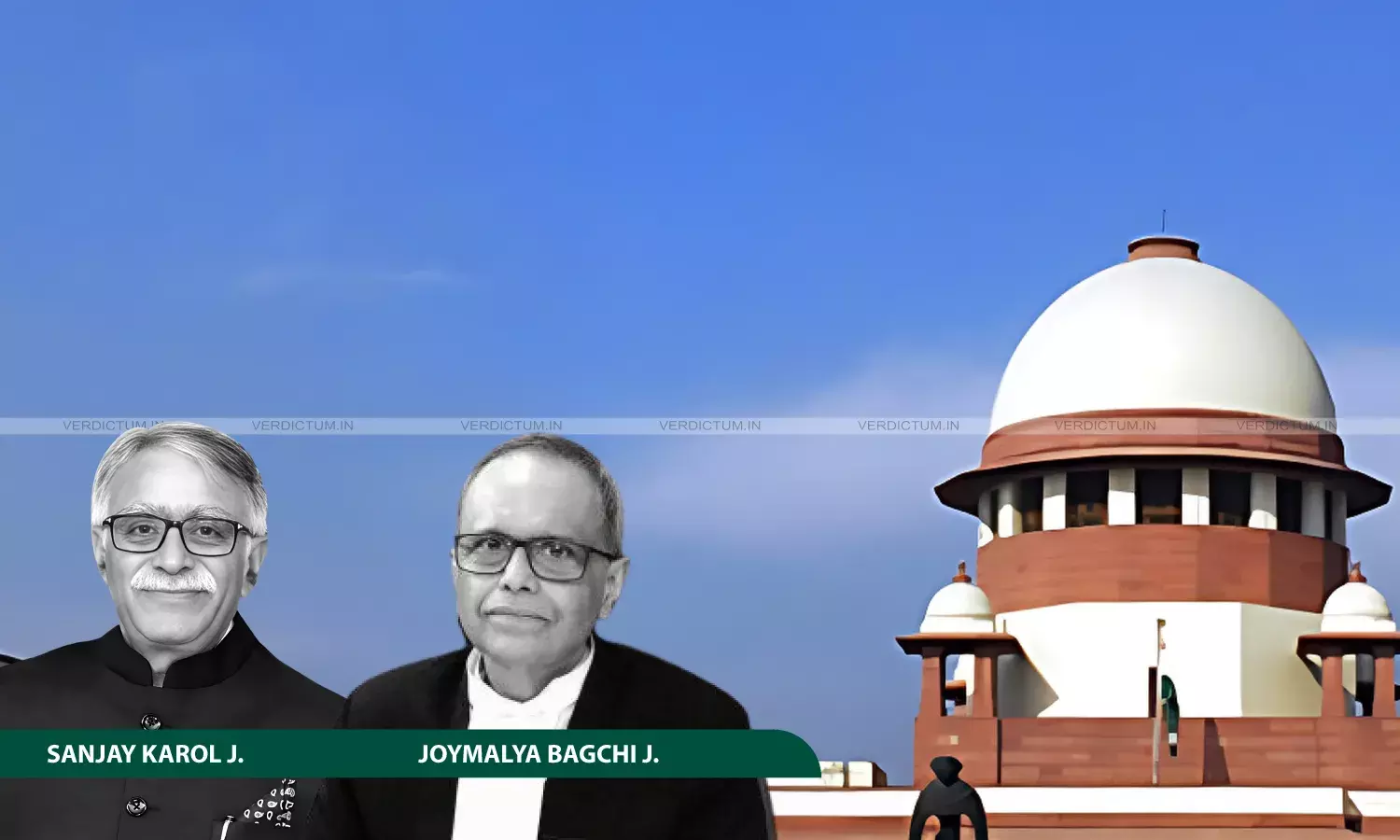Denying Female Heir Right In Property Only Exacerbates Gender Discrimination: Supreme Court Grants Relief To Tribal Woman’s Heirs
The appeal before the Supreme Court was preferred against the judgment passed by the Chhattisgarh High Court affirming the judgment dismissing the suit of partition filed by the appellant-plaintiffs.

Justice Sanjay Karol, Justice Joymalya Bagchi, Supreme Court
While holding that the legal heirs of a tribal woman would be entitled to a share in the property of their maternal grandfather, the Supreme Court has observed that denying a woman her share in her father’s property, when the custom is silent, would violate her right to equality and exacerbate gender division.
The appeal before the Apex Court was preferred against the judgment passed by the Chhattisgarh High Court affirming the judgment dismissing the suit of partition filed by the appellant-plaintiffs.
The Division Bench of Justice Sanjay Karol and Justice Joymalya Bagchi said, “Similarly, we are of the view that, unless otherwise prescribed in law, denying the female heir a right in the property only exacerbates gender division and discrimination, which the law should ensure to weed out.".
“Granted that no such custom of female succession could be established by the appellant-plaintiffs, but nonetheless it is also equally true that a custom to the contrary also could not be shown in the slightest, much less proved. That being the case, denying Dhaiya her share in her father’s property, when the custom is silent, would violate her right to equality vis-à-vis her brothers or those of her legal heirs vis-à-vis their cousin", it added
Advocate Padmesh Mishra represented the Appellant while Advocate Bipin Bihari Singh represented the Respondent.
Factual Background
The appellants-plaintiffs are the legal heirs of one Dhaiya, a woman belonging to a Scheduled Tribe. They sought the partition of a property belonging to their maternal grandfather. Their mother was one of the six children - five sons and one daughter, stating that their mother is entitled to an equal share in the scheduled property. The cause of action arose in October 1992 when some defendants refused to make a partition. The appellant-plaintiffs approached the Trial Court seeking a declaration of title and partition of the suit property, but the suit was dismissed.
The First Appellate Court concurred with the findings of the Trial Court that the mother of the appellant-plaintiffs had no right in the property of her father. An appeal under Section 100 Code of Civil Procedure, 1908, was filed. The High Court upheld the Trial Court’s findings and also observed that the appellant-plaintiffs seeking partition of property had failed to establish their right over such property by way of custom, showing that a female heir is also entitled thereto. It was in such circumstances that the appeal came to be filed before the Apex Court.
Reasoning
The Bench, at the outset, made it clear that the question of the parties having adopted Hindu customs and way of life was no longer in play. “That apart, we may also notice Section 2(2) of the Hindu Succession Act, 1956, which unequivocally excludes from its application, Scheduled Tribes”, it said.
Since the Hindu Law had no application, the Bench came to the application of custom. “For the application of a custom to be shown, it has to be proved, but it was not in the present case. In fact, the Courts below proceeded, in our view, with an assumption in mind and that assumption was misplaced. The point of inception regarding the discussion of customs was at the exclusion stage, meaning thereby that they assumed there to be an exclusionary custom in a place where the daughters would not be entitled to any inheritance and expected the appellant-plaintiffs to prove otherwise. An alternate scenario was also possible where not exclusion, but inclusion could have been presumed and the defendants then could have been asked to show that women were not entitled to inherit property. This patriarchal predisposition appears to be an inference from Hindu law, which has no place in the present case”, it said.
As per the Bench, there appeared to be no rational nexus or reasonable classification for only males to be granted succession over the property of their forebears and not women, more so in the case where no prohibition to such effect could be shown to be prevalent as per law. Reference was also made to the most commendable step taken under the Hindu Law by way of the Hindu Succession (Amendment) Act, 2005, which made daughters the coparceners in joint family property.
The Bench thus held that denying Dhaiya her share in her father’s property, would violate her right to equality. Allowing the appeal, the Bench held that the appellant-plaintiffs, being Dhaiya’s legal heirs, are entitled to their equal share in the property.
Cause Title: Ram Charan & Ors. v. Sukhram & Ors (Neutral Citation: 2025 INSC 865)
Appearance
Appellant: Advocates Padmesh Mishra, Vastvikta Bhardwaj, Nikunj Goyal, Mr. Aditya, Vijant, AOR Neelam Singh
Respondent: Advocate Bipin Bihari Singh, AOR Ashok Anand, Advocates Anand Singh, Aakash Kakade, Rakesh Kumar Singh, AOR Sumeer Sodhi

